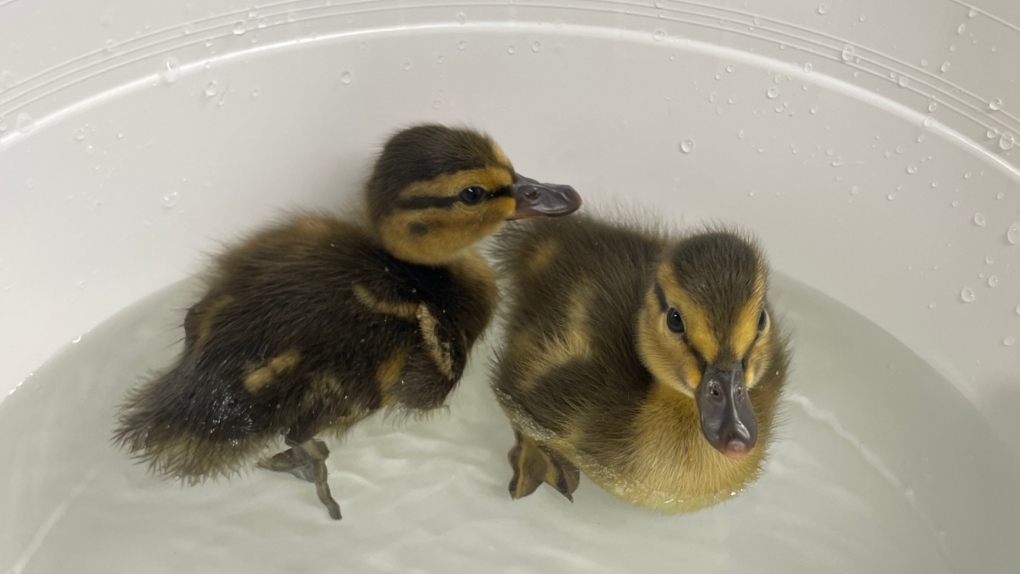Ducklings rescued from 11th floor Vancouver condo balcony after crows move in
 The Wildlife Rescue Association of BC shared this photo of two ducklings recently rescued from a highrise balcony. (Image credit: Facebook/WildlifeRescue)
The Wildlife Rescue Association of BC shared this photo of two ducklings recently rescued from a highrise balcony. (Image credit: Facebook/WildlifeRescue)
Two ducklings that were being picked on by crows were rescued from an 11th-storey balcony in downtown Vancouver, as calls to a local organization about hatchlings on high-rises began their annual spike.
In this case, the mother mallard nested in a planter outside of a condo and found herself in a "dilemma" when her eggs hatched, according to Jackie McQuillan with the Wildlife Association of B.C.
"She was trying to get them where they needed to go and she couldn't," she said.
When it came time to try to guide the babies to water – which typically happens within days of hatching – the mother found it was impossible because of the location of the nest and the ducklings' inability to fly.
"Mama ended up taking off. She was so frantically trying to get them to follow her, she took off and then the babies were on their own," McQuillan said.
"It made for a very tricky start to life for these little ones."
After their mom flew away, the crows moved in on the vulnerable ducklings which caused the rescue to intervene and remove them. While crows preying on smaller animals is something McQuillan describes as a natural part of life in the wild – the circumstances here were anything but.
"The unnatural part of this scenario is that this happened on a condo where the mom couldn't successfully protect her babies and get them to safety on the water," she said.
"We will get hundreds of these types of rescue calls in the next couple of months."
Ducks and geese, in particular, are drawn to roofs and balconies of high-rises because they offer some safety from predators on the ground like raccoons, coyotes, and skunks. Nesting in these locations is also a response to the fact that urbanization has encroached on their natural habitats, limiting available space.
But moving to higher ground for safety comes with new risks – as it did in this case.
Ideally, McQuillan says, the rescue will be able to intervene and relocate the entire family.
"We can help them out, help them get down to ground level and find a safe spot to carry on their lives," she said.
Mallards are federally protected, so moving eggs or ducklings is not allowed without a permit. The association's website also explains that ducklings can safely jump to the ground from buildings less than two storeys high, provided there is not a barrier taller than 12 centimetres.
The first and most important thing anyone with concerns about a nest or hatchlings should do is to call the rescue, according to McQuillan.
"We're a hospital and a rehabilitation organization for injured and orphaned wild animals but a huge part of what we do is educate the public on humane coexistence with urban wildlife. Ultimately, that can save so many animals," she said.
The busy spring nesting season also coincides with the rescue association's annual fundraising raffle which is one way McQuillan says people can donate to support the work done by the volunteer-run non-profit – which will take in around 2,000 babies this summer alone.
CTVNews.ca Top Stories

B.C. carjacking suspect sped across U.S. border before arrest, police say
Authorities have arrested a suspect who allegedly carjacked a pickup truck in B.C.'s Lower Mainland then sped across the U.S. border, triggering a massive police response.
Alberta premier says federal border plan coming Monday
The much-anticipated federal plan to address issues at the Canada-U.S. border will be unveiled on Monday according to Alberta Premier Danielle Smith.
Ottawa has sold its stake in Air Canada: sources
Two senior federal government sources have confirmed to CTV News that the federal government has sold its stake in Air Canada. During the COVID-19 pandemic in 2021, the government purchased a six per cent stake in the airline for $500 million as part of a bailout package.
Premiers disagree on whether Canada should cut off energy supply to U.S. if Trump moves ahead with tariffs
Some of Canada's premiers appeared to disagree with Ontario Premier Doug Ford on his approach to retaliatory measures, less than a day after he threatened to cut off the province's energy supply to the U.S. if president-elect Donald Trump follows through on his threat of punishing tariffs.
'Very concerned': Crews search B.C. ski resort for missing man
Police and rescue crews are searching for a man who was last seen boarding a ski lift at B.C.'s Sun Peaks Resort Tuesday.
Man who set fires inside Calgary's municipal building lost testicle during arrest: ASIRT
Two Calgary police officers have been cleared of any wrongdoing in an incident that saw a suspect lose a testicle after being shot with an anti-riot weapon.
Blizzard warning shuts down large parts of midwestern Ontario
It was a day to stay home, if you could, across much of midwestern Ontario due to weather.
Travis Vader, killer of Lyle and Marie McCann, denied day parole
The man who killed an Alberta couple in 2010 has been denied day parole.
She took a DNA test for fun. Police used it to charge her grandmother with murder in a cold case
According to court documents, detectives reopened the cold case in 2017 and then worked with a forensics company to extract DNA from Baby Garnet's partial femur, before sending the results to Identifinders International.
































